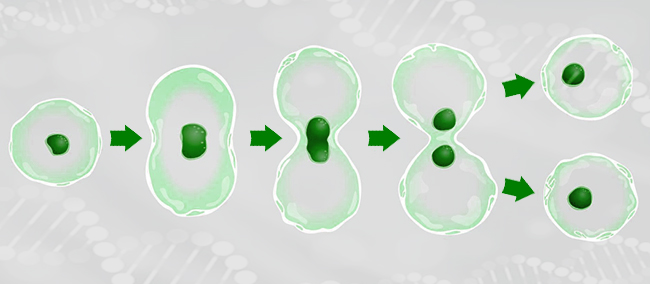
From the time we are born, the cells in our bodies are constantly replicating – creating and repairing the tissues of our organs, skin, bones, and more. This process, which splits one cell into two identical daughter cells, is called mitosis, and it allows the body to grow and heal over a lifetime.
For the most part, our cells are very efficient at dividing. But as we age, impairment can occur, and the information once provided by the mother cell gets lost upon replication. When this happens, DNA errors occur, and the cells no longer function properly. The results can cause dormant cells that no longer divide, as in aging, or uncontrolled cell division, as in cancer.
To better understand how cellular information is lost during mitosis, scientists are keen on examining the epigenetic mechanisms involved in DNA replication. Knowing this might lead to ways that help cells preserve their capabilities, potentially leading to improved aging outcomes and cancer prevention.
Recent research from the University of Copenhagen (UC) has shed light on the fate of DNA replication across cell division. In a study published in the journal Cell, a group of researchers at the Novo Nordisk Foundation Center for Protein Research at UC has discovered a previously unknown mechanism that helps cells retain their identity during division. The new mechanism is called H2A-H2B mediated epigenetic memory, and it restores chromatin landscapes during DNA replication.
“Once we fully understand this mechanism, it could help counteract cancer and aging. It is a part of the amazingly complex network acting to maintain function of each cell in our body,” says study author and UC professor Anja Groth. “If we disrupt this mechanism, we could make cells forget their identity and this could help turning them into other cell types which is useful in regenerative medicine.”
Epigenetic memory plays a crucial role in ensuring that cells maintain their specialized functions throughout the lifespan of an organism. Although all cells share the same genotype, it is the unique gene expression patterns that distinguish one cell type from another. Recent evidence suggests that chromatin state, which is determined by histone modifications and DNA methylation, plays a fundamental role in mediating epigenetic memory within cells.
When DNA replication takes place, chromatin landscapes are disrupted as the DNA double helix is unwound and copied. This disruption could result in changes to the way that the DNA is packaged and organized. Fortunately, specialized chemical marks retained in the process attach to the DNA and establish the correct cell type. The accumulation of these marks is what makes up the epigenome.
However, it can be challenging for DNA to read all the chemical marks fast enough during cell division, which could thus negatively impact the epigenome and ultimately affect the cell identity. In this study, the team found another type of marker that acts as a fast-tracking system to keep all the modifications in place. Like post-it notes tagged to the DNA, these additional markers help the cells maintain epigenetic memory during mitosis.
“Technically speaking, the identified mechanism helps maintain epigenetic cell memory during cell division,” says Postdoc and first author Valentin Flury. “We have done it by showing that epigenetic information on histones H2A-H2B is locally and accurately transmitted during DNA replication and, later on, helps to put correct information on histones H3 and H4.”
Although more research is needed to identify the exact molecular components that handle H2A-H2B during DNA replication, the study represents an exciting route to explore the epigenetic inheritance of histone modifications.
“It is very important for the fields of epigenetics and chromosome replication to realize that we have several layers of memory signals that together allow cells to maintain their functionality across cell division,” says Flury. “It emphasizes the fascinating, complex network acting in each cell of our body to guide development and counteract cancer and aging.”
Source: V. Flury, et al. Recycling of modified H2A-H2B provides short-term memory of chromatin states. Cell, Feb 2023
Reference: Previously unknown cell mechanism could help counter cancer and aging. University of Copenhagen – The Faculty of Health and Medical Sciences. February 8, 2023.

